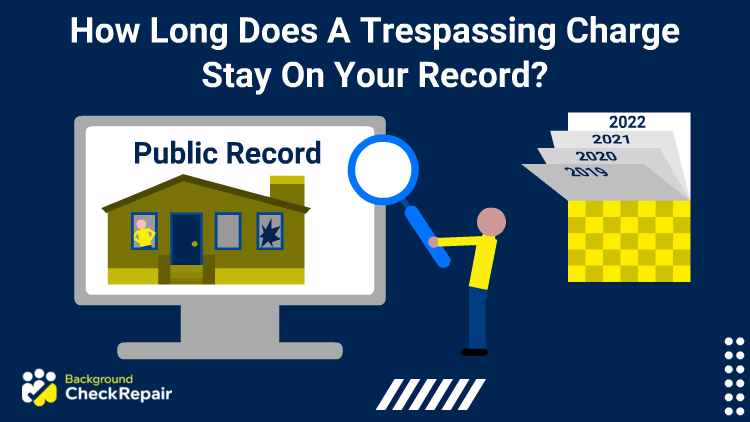
How long does a trespassing charge stay on your record? It depends.
Trespassing seems a minor offense compared to many other criminal complaints, but it can still have a long-lasting impact on an individual, particularly where their criminal record is concerned.
The duration of the charge on a criminal record depends on many different variables such as whether the charge led to a conviction and the state where the charge was filed, to name a couple. This complete guide explains the most important details concerning trespassing charges and their effect on a person’s criminal records.
How Long Does a Trespassing Charge Stay on Your Record?
The easiest way to know how long does a respassing charge stay on your record is to run a quick background check on yourself to see if the charge shows up. Depending how long ago it occurred, it may not show up on employment and other level 1 and level 2 background checks.
However for other criminal record checks, when wondering how long does a trespassing charge stay on your record, the general rule is that a criminal record sticks with an individual until the case is expunged. But, there are some extenuating factors.
Take a look at a breakdown of the questions which impact record duration.
1. Did the Charge Result in a Conviction?
Charges and arrests resulting in non-convictions are automatically sealed in some states and are usually eligible for expungement/sealing petitions sooner than convictions.
2. Was the Trespass Charged as a Misdemeanor or Felony?
Felony cases carry steeper penalties than misdemeanors and are usually not eligible for expungement or sealing for at least 10 years.
3. What Is the State of Residence?
State laws vary significantly on how long charges and convictions remain on an individual’s record, and some states are implementing automated record clearance for many misdemeanors. Moreover, each state dictates how long charges can show up on a person’s record.
What Are Trespassing Charges?
To answer the question “How long does a trespassing charge stay on your record?,” it is important to first understand what qualifies as a trespassing charge and when a trespassing charge goes on a criminal record.
In the vast majority of states and according to the Legal Information Institute of Cornell Law School,22 trespassing is defined as a deliberate decision to enter upon or remain upon someone else’s property. There must be evidence that the individual knew the property was off limits – either by verbal notice, signs, or logical deduction (fenced-off area) – and chose to ignore the restrictions and enter the property without authorization.11, 14, 20
The penalties for trespassing often include fines, jail time, and community service and are determined by the following factors:4
- If it was a first-time offense (First-time offenders are more likely to be given a warning or civil citation.)
- How the trespasser gained entry (A step over an unmarked line is less serious than jumping over a fence.)
- Whether it was apparent, to a reasonable person, that the property was private (Were there signs? Was the area enclosed or inhabited?)
- If the trespasser had a weapon (Intent to commit a further crime elevates a trespass charge.)
- Whether property was damaged (Some states automatically elevate to a felony if damage surpasses a specified dollar amount.)
What Is the Difference Between Trespassing and Criminal Trespassing? (Difference Between Criminal Trespass and Civil Trespass)
A key component in criminal trespassing is that the individual “knowingly” entered or remained upon another individual’s property, and this is the primary difference between criminal trespass and civil trespass. A civil trespass may occur when an individual unknowingly wanders onto private land, whereas a criminal trespass occurs when an individual intentionally enters or remains on private land, ignoring written or verbal notice.12, 21
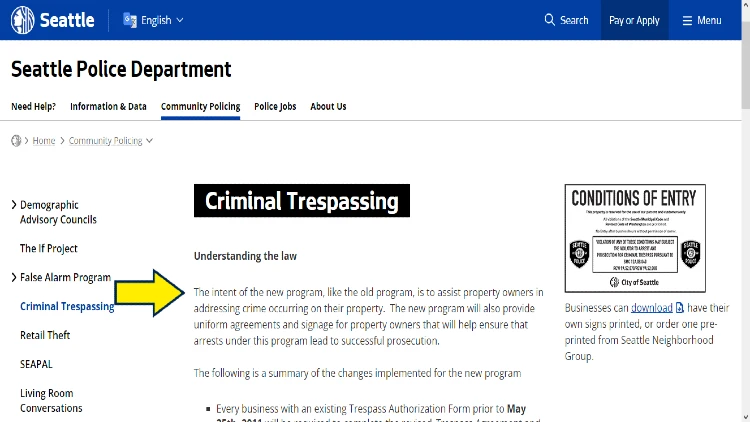
Like most large cities, Seattle outlines criminal trespassing laws on their website, especially in cases where the law has been recently changed to either lessen or increase the penalties and descriptions of what constitutes criminal trespass.
One other difference between trespassing and criminal trespassing is how the two cases are dealt with. Someone who commits a non-deliberate act of trespassing is likely to receive a warning or citation, while an individual who commits a criminal trespass can be charged with a misdemeanor.20
Is Criminal Trespassing a Felony?
Many people are curious to know “When is criminal trespassing a felony?” Though the laws differ by state, here are some possible situations when criminal trespassing may be elevated to a felony offense.11,14
- The trespasser intended to commit another crime.
- The trespasser entered a family home or other occupied structure.
- The trespasser had a weapon.
- The trespasser entered a vulnerable or protected site, such as a domestic violence center, a power plant, or an agricultural chemical facility.
- The trespasser caused damage to the property.
Is Trespassing on Private Property a Misdemeanor?
Trespassing on private property is illegal, and when an individual knowingly and willingly commits this offense, it is likely to be charged as a misdemeanor. Depending on the state, a private property trespass may only be charged as a misdemeanor when the offender has been asked by the property owner to vacate or when there is clear notice, such as signage, posted (See Massachusetts General Laws Chapter 266 Section 120).14
Can You Trespass on Public Property?
Many people believe that they cannot be punished for trespassing on public property, but in some instances, trespassing on public property is considered a serious crime. Government and state-owned spaces such as state and national parks, wildlife preserves, state-run health facilities (e.g. Veteran Affairs hospitals), and schools are some examples of spaces where people can only go at authorized times.21
This type of trespass can be charged as a federal crime, and fines and jail time can be harsher. Read about the Steps in the Federal Criminal Process.

Trespassing on public property generally refers to being on the premises either where access is prohibited or during hours when access is prohibited.
Note: An individual can also be charged with trespassing in a public space that is privately owned (such as a restaurant or store) if they have previously been told to vacate the premises.9
How Do Police Investigate Trespassing?
Many people wonder “How do police investigate trespassing?” when trespassers are rarely still on the property when the police arrive. This is a legitimate question, but as with any criminal offense, the police begin by collecting information at the scene of the crime.
The investigation typically involves questioning the property owner, taking statements from witnesses, and consulting any objective evidence, such as home security footage.18 The accused party is also likely to be questioned about their whereabouts. Police are looking for probable cause to incriminate the individual.
What Does a Criminal Trespass Warning Mean?
Some states have official criminal trespass warnings which may be issued to individuals caught committing a first-time trespass, such as Texas’ “Criminal Trespass Notice.” Other states may consider an informal warning from a property owner or police officer a criminal trespass warning, but what does a criminal trespass warning mean?
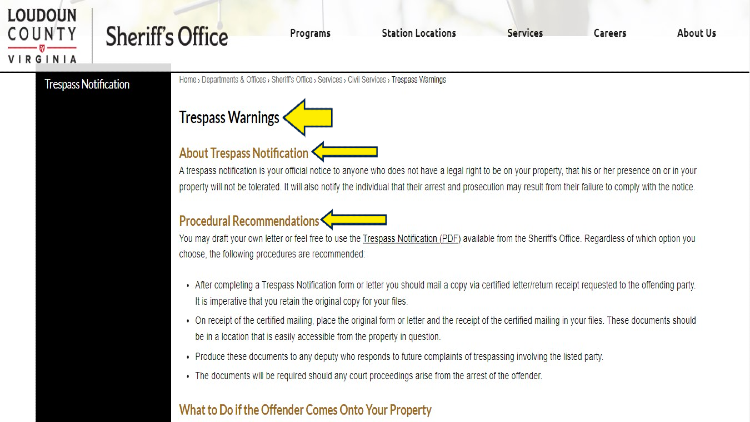
A trespass warning informs people about the property protections invoked.
A criminal trespass warning can be a verbal or written notice that an individual committing a trespass has been told to vacate a property. As such, a warning does not appear on an individual’s criminal history report, but it does provide a record for future encounters with police.19 It means that someone who violates this warning is more likely to be charged and convicted if they commit the offense a second time.8
Does Trespassing Go on Your Record? (Does a Trespass Go on Your Record?)
To fully flesh out the question “How long does a trespassing charge stay on your record?” it’s important to know when a trespass goes on your record.
In some cases, where trespass is ruled unintentional and the offender is cooperative, they may be given a verbal or written warning or a civil citation. These cases do not appear on a criminal record.
So, when does trespassing go on your record? A person’s criminal record documents arrests, warrants, charges, court proceedings, and case dispositions (convictions/acquittals).
Therefore, a criminal trespass goes on an individual’s record the moment that they are arrested, have a warrant issued for their arrest, are charged with a crime, or are convicted of a crime. Typically, a trespassing violation first appears as an arrest, warrant, or criminal charge.
How Long Does a Trespassing Charge Stay on Your Record by State?
Figuring out how long does a trespassing charge stay on your record in each state necessitates understanding the extent of the trespassing charge and the laws in each state. For example, a trespassing charge resulting in a misdemeanor conviction may be eligible for an expungement petition after 5 to 7 years in many states, while a felony trespassing charge can take 10 years or longer to become eligible (e.g. Florida Statute Title XLVI Chapter 810 Section 08).
Trespassing non-convictions may be sealed automatically in some states and are usually eligible for expungement within 1 to 3 years.6
| How Long Does a Trespassing Charge Stay on Your Record in Each State? | Record Duration |
| Alabama | 5 years |
| Alaska | Forever |
| Arizona | Until the person turns 99 years old |
| Arkansas | 5 years |
| California | Forever |
| Colorado | 7 years |
| Connecticut | Forever |
| Delaware | 5 years |
| Florida | Forever |
| Georgia | 2 years |
| Hawaii | 5 years |
| Idaho | 5 years |
| Illinois | 2 years |
| Indiana | 5 years |
| Iowa | 8 years |
| Kansas | 3 years |
| Kentucky | 1 – 3 years |
| Louisiana | 5 years |
Maine
| Forever |
| Maryland | 10 years |
| Massachusetts | 3 – 7 years |
| Michigan | 7 years |
| Minnesota | Forever |
| Mississippi | 2 years |
| Missouri | 3 – 7 years |
| Montana | 5 years |
| Nebraska | 3 years |
| Nevada | Forever |
| Hampshire | 2 years |
| New Jersey | 5 years |
| New Mexico | 2 years |
| New York | 10 years |
North Carolina
| 5 – 10 years |
| North Dakota | Forever |
| Ohio | Forever |
| Oklahoma | 5 years |
| Oregon | 3 years |
| Pennsylvania | 10 years |
| Rhode Island | 5 years |
| South Carolina | 3 years |
| South Dakota | 10 years |
| Tennessee | 5 years |
| Texas | 1 – 3 years |
| Utah | 5 years |
| Vermont | 5 – 10 years |
| Virginia | 7 years |
| Washington | 3 years |
| West Virginia | 1 year |
| Wisconsin | 20 years |
| Wyoming | 5 years |
Can You Be Charged With Trespassing if There Are No Signs?
One commonly held belief about criminal trespassing is that there must be “No Trespassing” signs for a trespasser to be charged, but can you be charged with trespassing if there are no signs?
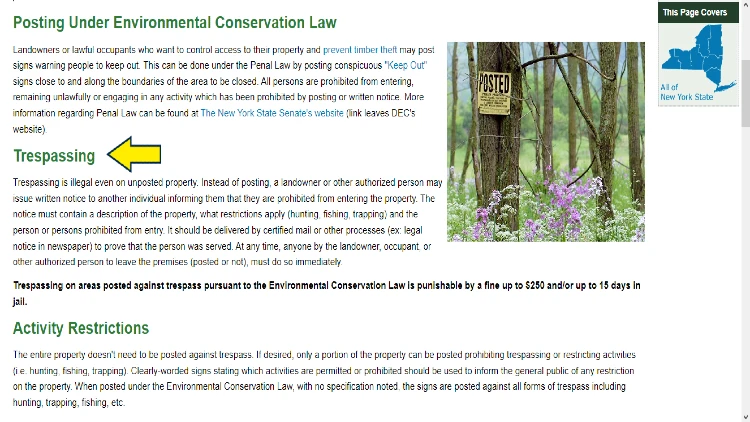
Even without a posted sign, trespassing charges can be filed if an owner’s property is violated.
Yes. Trespassing into a clearly private or occupied structure (such as a home or vehicle) or refusing to leave a property at the owner’s request are both considered criminal trespassing. Individuals may be charged without signs in these cases.
While clearly visible signs are encouraged, many state laws do not dictate the wording or placement of signs.5 Furthermore, other obstacles to entry, such as a fence or gate may suffice in place of a sign.
A property owner or police officer can tell a trespasser to leave at any time, and any individual who does not comply can be charged with criminal trespassing.
In summary, though signage is encouraged by most states, there are many cases where it is not required for a trespasser to be charged with a crime (see New York State Department of Environmental Conservation page). Find the law for the state of residence and consult with a defense attorney for legal advice.7,9
Can You Be Charged With Trespassing After the Fact?
Lots of people have mistakes in their past that they worry will come back to haunt them, leading many to wonder “Can you be charged with trespassing after the fact?” The quick answer is yes, it is possible to be charged later down the road. In fact, this is the more common scenario, as trespassers have often left the scene by the time police arrive.
In this case, an individual will be charged with trespassing if and when the police have found enough evidence to indicate the probable cause for their involvement and the prosecutors have determined the evidence is sufficient to move forward.
Continue reading for more information on the statute of limitations for trespassing in each state.
Statute of Limitations for Trespassing in Each State
Many people have wondered about the duration within which the police must file charges for a crime. States carry distinct laws dictating statutes of limitations, and these often differ according to the crime.
More severe crimes often have a longer statute of limitation than minor offenses. In many states, the statute of limitations for trespassing is up to 2 years, but it is important to know and understand the law in the state of residence.
| State Statute of Limitations – Trespassing | Timeframe |
| Alabama | 1 year |
| Alaska | 5 years |
| Arizona | 1 to 7 years |
| Arkansas | 3 to 6 years |
| California | 3 years |
| Colorado | 18 months |
| Connecticut | 3 years |
| Delaware | 3 years |
| District of Columbia | 3 years |
| Florida | 4 years |
| Georgia | 4 years |
| Hawaii | 2 years |
| Idaho | 3 years |
| Illinois | 5 years |
| Indiana | 2 years |
| Iowa | 5 years |
| Kansas | 2 years |
| Kentucky | 3 years |
| Louisiana | 2 years |
| Maine Statute | 6 years |
| Maryland | 3 years |
| Massachusetts | 3 years |
| Michigan | 6 years |
| Minnesota | 6 years |
| Mississippi | 3 years |
| Missouri | 5 years |
| Montana | 2 years |
| Nebraska | 4 years |
| Nevada | 1 year |
| New Hampshire | 2 years |
| New Jersey | 1 – 5 years |
| New Mexico | 4 years |
| New York | 3 years |
| North Carolina | 3 years |
| North Dakota | 20 years |
| Ohio | 4 years |
| Oklahoma | 2 years |
| Oregon | 6 years |
| Pennsylvania | 2 years |
| Rhode Island | – |
| South Carolina | 3 years |
| South Dakota | 6 years |
| Tennessee | 3 years |
| Texas | 2 years |
| Utah | 3 years |
| Vermont | 3 years |
| Virginia | 5 years |
| Washington | 3 years |
| West Virginia | 2 years |
| Wisconsin | 6 years |
| Wyoming | 5 years |
How To Find Out if You Have a Trespassing Charge (How Long Does a Trespassing Charge Stay on Your Record?)
Knowing how to know if criminal charges are filed is extremely helpful for individuals who want to hire an attorney and fight a criminal charge.
The easiest ways how to find out if you have a trespassing charge are to search local and state databases for records of charges, contact the district court in the area where the trespass occurred and inquire or get a criminal background check on yourself. Individuals can also request their own Identity History Summary Checks.
Can Trespassing Charges Be Dropped?
Knowing how long does a trespassing charge stay on your record is very important for individuals who have had formal charges filed against them, but can trespassing charges be dropped before they are officially filed?
The quick answer: Yes, they can, and here are some reasons why.17
- Trespassing is a relatively minor offense, and some prosecutors may determine that the state does not have sufficient resources to prosecute.
- The defendant negotiates a deal with the prosecution.
- The prosecution lacks evidence sufficient to incriminate the charged individual.14
- The property owner no longer wishes to cooperate with the prosecution.
- Witnesses for the prosecution are unreliable or unavailable.
- There were procedural errors by police or prosecution.
Charges can also be dropped by the prosecutor after they have been officially filed, usually for the same reasons mentioned above. In these cases, the charges still appear on the criminal record for a period of time.
Signs Your Case Will Be Dismissed (Dismissed Trespassing Charge)
As few as 10% of cases end up in trial court, as the vast majority of charges are dropped before the court date. If the prosecution’s case is weak, the preliminary hearing with the judge or grand jury may result in a dismissed trespassing charge. There are some indicators your case will be dismissed, such as:10
- Evidence is insufficient
- Evidence has been lost
- The witness is unavailable/unreliable
- Victim is non-cooperative
- There was no probable cause
- Mistakes and inconsistencies in the criminal complaint cast doubt on the accuser’s credibility
- Procedural errors (prosecutor and/or police)
How To Beat a Trespassing Charge
There are many situations when an individual might want to know how to beat a trespassing charge. For example, suppose any of the following were true:
- The accused was unaware that they were trespassing or that the property was private.
- The accused wandered onto the property by mistake (e.g. someone lost).
- The accused attempted to leave the property when asked but was barred or prevented from doing so.
- The accused was a juvenile and made an impulsive decision.
- The accused believes they had a right to be on the property.
- The accused trespassed out of necessity (e.g. someone pursued).
Whether any of these scenarios fit an individual’s particular case or not, the first step to beating a trespassing charge is getting a report of the charges and evidence in the case by contacting the police department or district court.
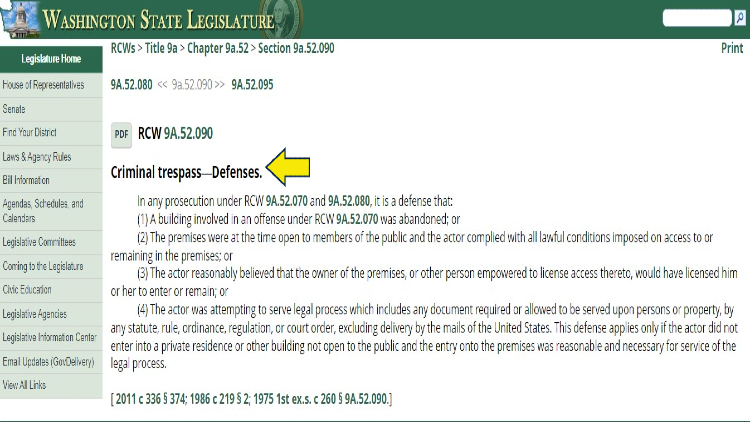
There are ways to defend against a criminal trespassing charge, and each state has its own definition of what can be disputed.
Secondly, the individual should consult with their attorney on how to build the best defense against the trespassing charge. Lack of criminal intent in the trespassing offense is a big component, and if an attorney can show that the accused did not knowingly and willingly trespass on another’s property, there is a decent chance the charges can be overcome.4,11
How To Charge Someone With Trespassing
There are times when a person may want to know how to charge someone with trespassing. Even though 9 times out of 10, victims of a crime aren’t actually the ones pressing charges, the role of the victim in a trespassing case is crucial.
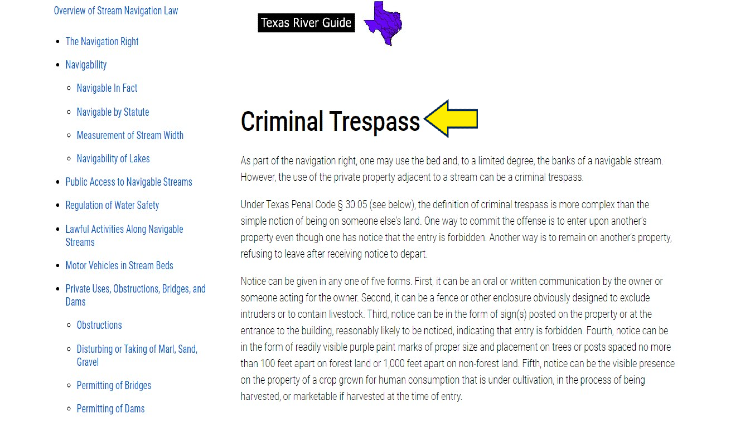
Depending on the location of the trespass, charges are filed by the official prosecutor.
The victim of trespassing is the property owner, and property owners may file a civil suit for any damages caused by the trespasser, but most times, a criminal complaint comes first.
Any property owner/manager who wants to press charges for trespassing should call the police and report the crime as soon as possible. Although there is a good chance the trespasser will no longer be on the premises when the police arrive, the owner’s memory of the trespasser and details surrounding the crime may be enough to warrant probable cause for arrest.
When the police arrive, the reporter of the crime should be prepared to provide specific details about the incident and identification of self and alleged trespasser (if known). For a person to be charged with criminal trespassing, there needs to be evidence that the individual knowingly and willingly entered into or remained on private property.19
When an individual has been charged with a crime, it’s important for them to know their rights and understand the details of their case. Knowing what they stand accused of, the penalties for trespassing in their state, and how long does a trespassing charge stay on your record can help motivate and prepare the defendant to fight the charges confronting them.
Frequently Asked Questions About How Long Does a Trespassing Charge Stay on Your Record








